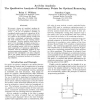60 search results - page 7 / 12 » Subspace Constrained Mean-Shift |
149
Voted
AAAI
1994
15 years 3 months ago
1994
We present a theory of a modeler's problem decomposition skills in the context of optimal reasonzng -- the use of qualitative modeling to strategically guide numerical explor...
162
click to vote
CVPR
2009
IEEE
16 years 9 months ago
2009
IEEE
The articulated body models used to represent human motion typically have many degrees of freedom, usually expressed as joint angles that are highly correlated. T...
152
click to vote
TIFS
2008
15 years 1 months ago
2008
We present a theory for constructing linear subspace approximations to face-recognition algorithms and empirically demonstrate that a surprisingly diverse set of face-recognition a...
134
click to vote
ICCS
2007
Springer
15 years 8 months ago
2007
Springer
We present a Dynamic Data Driven Application System (DDDAS) to track 2D shapes across large pose variations by learning non-linear shape manifold as overlapping, piecewise linear s...
125
click to vote
SIAMJO
2008
15 years 1 months ago
2008
We present an algorithm for large-scale equality constrained optimization. The method is based on a characterization of inexact sequential quadratic programming (SQP) steps that ca...

